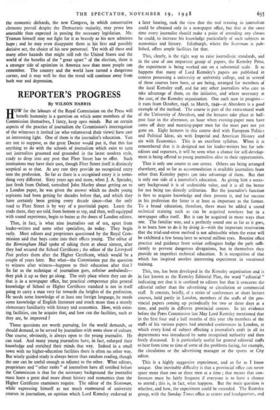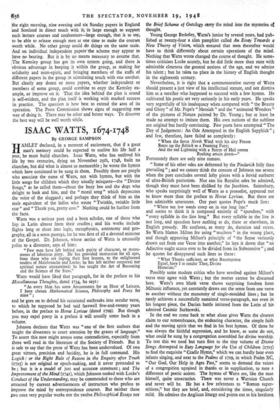REPORTER'S PROGRESS
By WILSON HARRIS
HOW far the labours of the Royal Commission on the Press will benefit humanity is a question on which some members of the Commission themselves, I fancy, keep open minds. But on certain aspects of the practice of journalism the Commission's interrogation of the witnesses it invited (or who volunteered their views) have cast an interesting light. One of them is the journalist's education. You are not to suppose, as the great Doctor would put it, that this has anything to do with the schools of journalism which exist to turn out journalists groomed and grounded in the latest modern style, ready to drop into any post that Fleet Street has to offer. Such institutions may have their uses, though Fleet Street itself is distinctly sceptical as to that. At any rate they provide no recognised entry into the profession. So far as there is a recognised entry it is some- thing very different. Sixty years ago and more, when J. A. Spender, just fresh from Oxford, consulted John Morley about getting on to a London paper, he was given the answer which no doubt young aspirants had been getting for decades before that, and which they have certainly been getting every decade since—that the only road to Fleet Street is by way of a provincial paper. Learn the trade there, they are told, from bottom to top, and then, well equipped with sound experience, begin to batter at the doors of London editors.
That, in fact, is what nine journalists out of ten, apart from leader-writers and some other specialists, do today. They begin early. Most editors and proprietors questioned by the Royal Com- mission said that boys come into their offices young. The editor of the Birmingham Mail spoke of taking them at about sixteen, after they had secured the School Certificate ; the editor of the Liverpool Post prefers them after the Higher Certificate, which would be a couple of years later. But what—the Commission put the question to witness after witness—happens to their education after that ? So fai as the technique of journalism goes, solvitur ambulando- they pick it up as they go along. The only place where they can do that is in a newspaper office, but practical competence plus general knowledge of School or Higher Certificate standard is not in itself going to carry a man very far towards the heights of the profession. He needs some knowledge of at least one foreign language, he needs some knowledge of English literature and much more than a merely elementary familiarity with history and economics. How, with exist- ing facilities, can he acquire that, and how can the facilities, such as they are, be improved ?
Those questions are worth pursuing, for the world demands, or should demand, to be served by journalists with some show of culture. One course, obviously, is always open to the young journalist. He can read. And many young journalists have, in fact, enlarged their knowledge and enriched their minds that way. Indeed in a small town with no higher-education facilities there is often no other way. But wisely guided study is always better than random reading, though the one can be useful enough as adjunct to the other. What editors, proprietors and " other ranks " of journalism have all testified before the Commission is that for the necessary background the journalist must learn a great deal more about history and economics than the Higher Certificate examiners require. The editor of the Scotsman, while expressing himself as not much enamoured of university courses in journalism, an opinion which Lord Kemsley endorsed at a later hearing, took the view that the real training in journalism could be obtained only in a newspaper office, but that at the same time every journalist should make a point of attending any classes he could, to increase his knowledge particularly of such subjects as economics and history. Edinburgh, where the Scotsman is pub- lished, offers ample facilities for that.
This, clearly, is the right way to raise journalistic standards, and in the case of one important group of papers, the Kemsley Press, the experiment is being worked out on a substantial scale. It so happens that many of Lord Kemsley's papers are published in centres possessing a university or university college, and in several of these courses have been, or are being, arranged for members of the local Kemsley staff, and for any other journalists who care to take advantage of them, on the initiative, and where necessary at the cost, of the Kemsley organisation. One such now in progress— it runs from October, 1948, to March, 1949—at Aberdeen is a good example of the method. The course is part of the extra-mural work of the University of Aberdeen, and the lectures take place at half- past four in the afternoon, an hour when evening-paper men have come off duty and morning-paper men for the most part not yet gone on. Eight lectures in this course deal with European Politics and Political Ideas, six with Imperial and American History and six with Economics. This is an excellent syllabus. When it is remembered that it is designed not for leader-writers but for sub- editors and reporters, it will be seen what a chance for self-develop- ment is being offered to young journalists alive to their opportunities.
That is only one course in one centre. Others are being arranged elsewhere, and so far as accommodation is available journalists from other than Kemsley papers can take advantage of them. But that is only one side of a journalist's education. As giving him a neces- sary background it is of undeniable value, and it is all the better for not being too directly utilitarian. But the journalist's function is first to acquire knowledge and then present it, and for success in his profession the latter is at least as important as the former. To a broad education, therefore, there must be added a sound technical training such as can be acquired nowhere but in a newspaper office itself. But it can be acquired in more ways than one. The familiar way, and a perfectly sound one as far as it goes, is to learn how to do it by doing it—with the important reservation that the trial-and-error method is not admissible when the error will be exhibited a few hours later to several million eyes. Routine office practice and guidance from senior colleagues hedge the path suffi- ciently to prevent dangerous divagations, but in themselves they provide an imperfect technical education. It is recognition of that which has inspired another interesting experiment in vocational training.
This, too, has been developed in the Kemsley organisation and is in fact known as the Kemsley Editorial Plan, the word "editorial " indicating not that it is confined to editors but that it concerns the editorial rather than the advertising or circulation or commercial staff. It consists, briefly, of a series of conferences or short lecture courses, held partly in London, members of the staffs of the pro- vincial papers coming up periodically for two or three days at a time, and partly in different provincial centres. In his evidence before the Press Commission last May Lord Kemsley mentioned that in the first four and a half months of this year 189 members of the staffs of his various papers had attended conferences in London, at which every kind of subject affecting a journalist's craft in all its departments was introduced by some recognised authority and then freely discussed. It is particularly useful for general editorial staffs to hear from time to time of some of the problems facing, for example, the circulation or the advertising manager or the sports or City editor.
This is a highly suggestive experiment, and so far as I know unique. One inevitable difficulty is that a provincial office can never spare more than two or three men at a time ; that means that con- ferences must be fairly frequent if everyone is to have a chance to attend ; this is, in fact, what happens. But the main question is whether, and how, the experiment could be extended. The Kemsley group, with the Sunday Times office as centre and headquarters, and the eight morning, nine evening and six Sunday papers in England and Scotland in direct touch with it, is large enough to support such lecture courses and conferences—large enough, that is to say, to be able to release enough men at one time to make the courses worth while. No other group could do things on the same scale. And on individual independent papers 'the scheme may appear to have no bearing. But it is by no means necessary to assume that.
Kemsley emsley group has got its own system going, and there is obvious advantage in keeping it within the group, as making for solidarity and team-spirit, and bringing members of the staffs of different papers in the group in stimulating touch with one another. But clearly any dozen or more papers, whether independent or members of some group, could combine to copy the Kemsley ex- ample, or improve on it. That the idea behind the plan is sound is self--evident, and the plan itself is working with marked success in practice. The question is how best to extend the area of its operation. The Press Commission shows signs of suggesting one way of doing it. There may be other and better ways. To discover the best way will be well worth while.



































 Previous page
Previous page